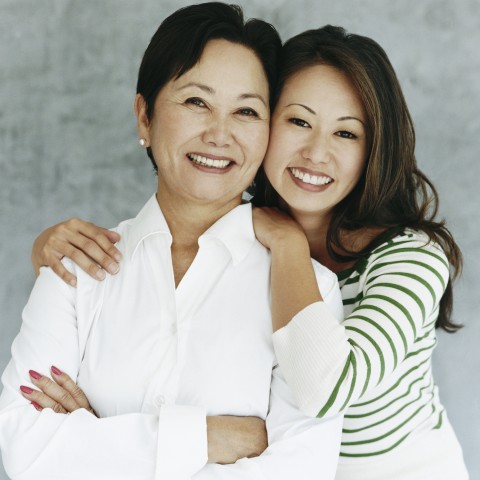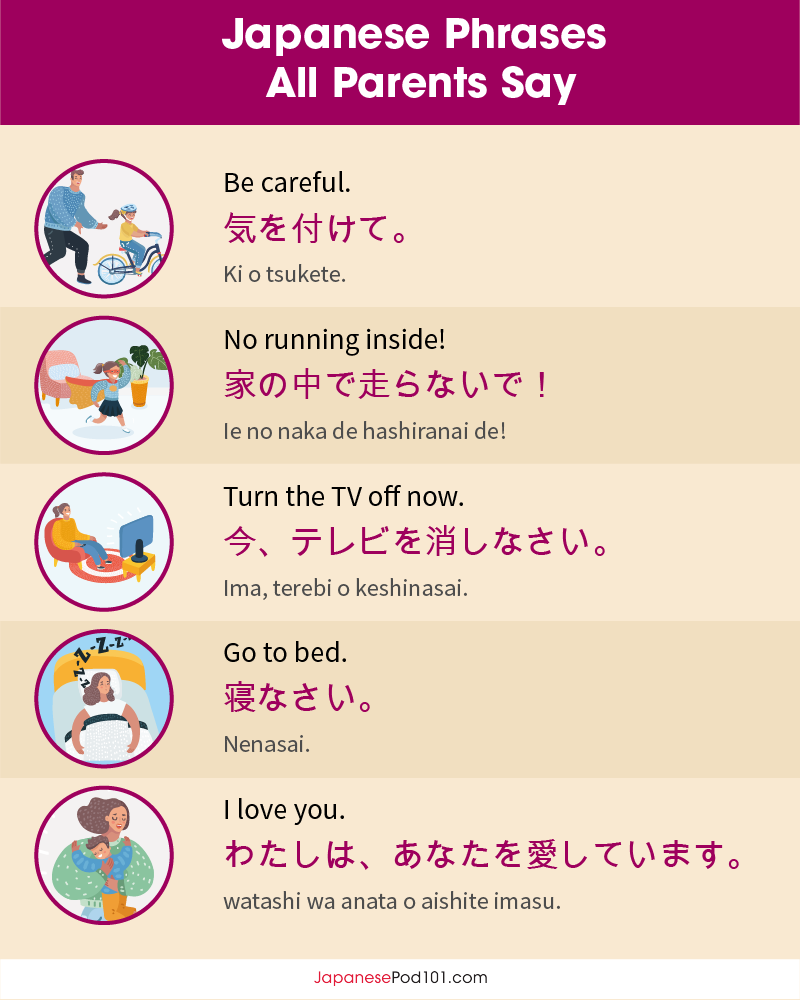Learning a foreign language isn’t only about the language itself, but also about its culture, customs, and society. Family is the minimum unit of a social group, and it’s important to understand its characteristics as this is closely related to culture and customs.
When you learn how to explain your family in Japanese, it helps to expand your vocabulary and improve your communication skills in Japanese.
Compared to English, there are many more words to describe family members in Japanese. These words are according to age and the style (formal and informal). For example, what is a Japanese father-in-law called?
Let’s learn how to describe family in Japanese at JapanesePod101.com. Here’s our list of the most useful Japanese words and family member terms, as well as important information about family in Japan.
Table of Contents
- Family in Japan – Cultural Perspective
- Basic Family Terms
- Terms of Relatives
- Family Terms as a Married Person
- Endearment Terms
- How to Describe Family and Ask Question about Family in Japanese
- Conclusion: How Japanesepod101 Can Help You Learn More Japanese

1. Family in Japan – Cultural Perspective
Before we move onto the actual family vocabulary, it’s important that we go over family roles in Japanese culture, family values in Japanese society, and the importance of family in Japanese culture. This will give you a better idea of what to expect from Japanese families, and give more context to the Japanese family vocabulary and phrases you’re going to learn!
1- Traditional and Modern Family in Japan
The traditional Japanese family is characterized by the 家 (Ie) or family system, which is literally translated as “household.” It refers to a home and family’s lineage, which bestows importance of kinship and loyalty to their family.
Each member of a family is expected to serve their family’s interests (rather than the individual’s) as a priority. The Japanese family is traditionally patriarchal and a household usually consists of grandparents, their son, his wife, and their children. The eldest son is expected to inherit the household assets, and he’s responsible for taking care of his parents when they get old.
In the modern Japanese family, however, the influence of the traditional ie system isn’t as strong as it used to be. A 核家族 (kaku kazoku) or “nuclear family” is very common nowadays, and consists of two parents and their children, typically centering on a married couple.
While a married couple is expected to live together with a husband’s parents in the traditional Japanese family, grandparents don’t live with a kaku kazoku in a modern Japanese family (although they are visited often).
2- Becoming a Family in Japan (Marriage)
In Japan, the 戸籍 (Koseki) or “family registration system” is mandatory to all households. It requires that the family records all changes in family composition and identity, such as births, deaths, marriages, divorces, acknowledgements of paternity, adoptions, and disrupted adoptions.
It’s required to register one person as the head of a household, and the rest of the members in a household must have the same surname as that of the head. Once a couple gets married, spouses are obligated to have the same surname, and registration of different surnames is not allowed.
Due to the traditional system and the importance of kinship as custom, marriage isn’t only a matter of the bride and groom, but also of their extended family. It’s expected that extended families from both sides are going to have a “family relationship” once a couple gets married in Japan. As such, relationships with one’s in-laws become important.
3- Expressions of Family in Japan
There are various words to name family members in Japanese.
Japanese vocabulary words to describe family count age difference, and there are particular names related to age. This is because age is regarded as one of the most important attributions in the Japanese society, which is greatly influenced by the concept of Confucianism that states seniority is highly respected.
As relationships with in-laws are also culturally important, there are particular names for them as well.
In addition, there are variations of how to express family members, ranging from very casual to formal. Which ones to use depend on the occasion.
Let’s dive into the details in the following sections, and get you started with common family words in Japanese.
2. Basic Family Terms
Now, it’s time to learn some basic Japanese words for family members. These are the words you’ll most often hear and use!
1- Basic Family Vocabularies
The formal terms are usually used for official occasions and in written form, while the informal terms are commonly used in casual situations (orally) as well as when calling a family member.
| English | Formal | Informal |
|---|---|---|
| I / me | 私(わたし | – |
| watashi | ||
| father | 父(ちち | お父さん |
| chichi | o-tō-san | |
| mother | 母(はは) | お母さん |
| haha | o-kā-san | |
| older sister | 姉(あね) | お姉さん / お姉ちゃん |
| ane | o-nee-san / o-nee-chan | |
| younger sister | 妹(いもうと) | – |
| imōto | ||
| older brother | 兄(あに) | お兄さん / お兄ちゃん |
| ani | o-nii-san / o-nii-chan | |
| younger brother | 弟(おとうと) | – |
| otōto | ||
| grandfather | 祖父(そふ) | おじいさん / おじいちゃん |
| sofu | o-jii-san / o-jii-chan | |
| grandmother | 祖母(そぼ) | おばあさん / おばあちゃん |
| sobo | o-bā-san / o-bā-chan | |
| great grandfather | 曽祖父 (そうそふ) | ひいおじいさん/ ひいおじいちゃん |
| sōsofu | hii-o-jii-san / hii-o-jii-chan | |
| great grandmother | 曽祖母(そうそぼ) | ひいおばあさん/ ひいおばあちゃん |
| sobo | hii-o-bā-san / hii-o-bā-chan | |
| grandchild(ren) | 孫 (まご) | ー |
| mago | ||
| great grandchild(ren) | ひ孫(ひまご) | ー |
| himago |
Average modern Japanese families usually have 1 or 2 children.
2- More Vocabulary
- 家族 かぞく (Kazoku) : family
- 両親 りょうしん (Ryōshin) : parents (father & mother)
- 親 おや (Oya) : parent(s)
- 子供 こども (Kodomo) : child(ren)
- 兄弟 きょうだい (Kyōdai) : brothers
- 姉妹しまい (Shimai) : sisters
3- Examples
Here are some examples of Japanese phrases for family, so you have a better idea how to use the vocabulary above.
- 私の家族は、お母さん、お父さん、私、弟の4人家族です。
Watashi no kazoku wa, o-kā-san, o-tō-san, watashi, otōto no yo-nin kazoku desu.
My family has four members: mother, father, me, and my younger brother. - 私は姉と妹がいる3姉妹です。
Watashi wa ane to imōto ga iru san-shimai desu.
I have an older sister and a younger sister, and we are three sisters. - 私は兄と姉がいます。
Watashi wa ani to ane ga imasu.
I have an older brother and an older sister. - 私は祖父と祖母が大好きです。
Watashi wa sofu to sobo ga daisuki desu.
I like my grandfather and grandmother very much.
To listen to the pronunciation of basic family terms, please visit Must-Know Terms for Family Members on our website.
Also, if you would like to know more about Japanese numbers, please visit our Japanese Numbers article.
The bond between a mother and a daughter is often very strong.
3. Terms of Relatives
1- Vocabulary for Relatives
- 親戚 しんせき (Shinseki) : relatives
- 叔父 おじ (Oji) : uncle
- 叔母 おば (Oba) : aunt
- 甥 おい (Oi) : nephew
- 姪 めい (Mei) : niece
- いとこ (Itoko) : cousin
2- Examples
- 私の親戚は全員東京に住んでいます。
Watashi no shinseki wa zen’in Tōkyō ni sunde imasu.
All my relatives live in Tokyo. - 私は5人いとこがいます。
Watashi wa go-nin itoko ga imasu.
I have five cousins. - 私の叔父と叔母は教師です。
Watashi no oji to oba wa kyōshi desu.
My uncle and my aunt are teachers. - 私の姪は5歳で、甥は2歳です。
Watashi no mei wa go-sai de, oi wa ni-sai desu.
My niece is five years old and my nephew is two years old.
4. Family Terms as a Married Person
1- Vocabulary to Know as a Married Person
- 結婚 けっこん (Kekkon) : marriage
- 既婚 きこん (Kikon) : married
- 未婚 みこん (Mikon) : unmarried
- 離婚 りこん (Rikon) : divorce
- 夫 おっと (Otto) : husband
- 妻 つま (Tsuma) : wife
- 息子 むすこ (Musuko) : son
- 娘 むすめ (Musume) : daughter
- 義理の ぎりの (Giri no) : in-law
In order to express “XXX in-law,” add 義理の (Giri no) in front of XXX (the family member).
For example:
- 義理の両親 (Giri no ryōshin) : parents-in-law
- 義理の父 (Giri no chichi) : father-in-law
- 義理の母 (Giri no haha) : mother-in-law
- 義理の兄 (Giri no ani) : older brother-in-law
- 義理の弟 (Giri no otōto) : younger brother-in-law
- 義理の姉 (Giri no ane) : older sister-in-law
- 義理の妹 (Giri no imōto) : younger sister-in-law
2- Examples
- 私は夫と娘が1人います。
Watashi wa otto to musume ga hitori imasu.
I have a husband and one daughter. - 私の義理の父と母は大阪に住んでいます。
Watashi no giri no chichi to haha wa Ōsaka ni sunde imasu.
My father and mother in-law live in Osaka. - 私は既婚者で子供が2人います。
Watashi wa kikonsha de kodomo ga futari imasu.
I am married and I have two children. - 私の義理の両親は、私の息子におもちゃを買いました。
Watashi no giri no ryōshin wa, watashi no musuko ni omocha o kaimashita.
My parents-in-law bought a toy for my son.
5. Endearment Terms
In addition to the formal and informal terms for family, there are also more casual vocabulary words that you can call family members. It may vary from household to household, or on what kind of relationships there are between family members, but here are some examples. Just note that these are typically used in Japanese family relationships that are close.
1- Father
- パパ (Papa) : papa
Like in English, “papa” is a common name to call a father in Japan, especially when children are very small. However, most Japanese people don’t use papa as they grow up.
- 父ちゃん (Tō-chan) : dad
This term includes a nuance of cute and comical affection.
- おやじ (Oyaji) : dad
This term is usually used by sons who are post-adolescent age. When they become adults, they often feel embarrassed to call their father papa or o-tō-san. This term also indicates a nuance of close affection.
2- Mother
- ママ (Mama) : mama
Just like papa, mama is used especially when children are still small.
- 母ちゃん (Kā-chan) : mom
This is the version of tō-chan used for mothers.
- お袋 (Ofukuro) : mom
This is the mother version of oyaji.
3- Grandfather
- じじ (Jiji) : grandpa
Grandchildren and their parents usually call a grandfather by this term when the grandchildren are still small. It indicates a nuance of cute affection.
- じーじ (Jīji) : grandpa
This is very similar to jiji, but the first ji is pronounced longer.
4- Grandmother
- ばば (Baba) : grandma
This is the grandmother version of jiji.
- ばーば (Bāba) : grandma
This is the grandmother version of jīji.
Grandparents often have endearing nicknames when they have grandchildren.
6. How to Describe Family and Ask Question about Family in Japanese
Most of the time, there’s no problem with talking about family and relatives. When it comes to marital status and children, however, it can be a delicate matter. It can sometimes be inappropriate to ask someone about his/her marital status or if they have children, unless he/she is open and willing to talk. This is especially true for a woman in her 30s.
Here are some example questions and answers related to family.
Q:
何人家族ですか。
Nan-nin kazoku desu ka.
How many family members do you have?
A:
お父さん、お母さん、お姉ちゃん、私の4人家族です。
O-tō-san, o-kā-san, o-nee-chan, watashi no yo-nin kazoku desu.
I have four family members: father, mother, older sister, and me.
—–
Q:
兄弟はいますか。
Kyōdai wa imasu ka.
Do you have brothers and sisters?
*When asking a question, kyōdai can also refer to sisters.
A:
私は姉と弟がいます。
Watashi wa ane to otōto ga imasu.
I have an older sister and a younger brother.
—–
Q:
結婚していますか。
Kekkon shite imasu ka.
Are you married?
A:
はい、妻と子供が2人います。
Hai, tsuma to kodomo ga futari imasu.
Yes, I have a wife and two children.
—–
Q:
孫はいますか。
Mago wa imasu ka.
Do you have grandchildren?
A:
はい、私は孫が6人います。
Hai, watashi wa mago ga roku-nin imasu.
Yes, I have six grandchildren.
—–
Q:
ご両親はお元気ですか。
Go-ryōshin wa o-genki desu ka.
How are your parents?
*It’s polite to put go in front of ryōshin when you talk about someone’s parents.
A:
はい、私の父と母は元気です。
Hai, watashi no chichi to haha wa genki desu.
Yes, my father and mother are doing well.
—–
For more about self-introductions, please visit Introducing Yourself in Japanese on our website.
7. Conclusion: How Japanesepod101 Can Help You Learn More Japanese
I hope this article about family in Japanese culture is useful and that it helps to improve your Japanese communication skills.
If you would like to learn more about the Japanese language, you’ll find more useful content on JapanesePod101.com. We provide a variety of free lessons for you to improve your Japanese language skills. For example, Must-Know Terms for Family Members is helpful if you want to practice family terms in Japanese with audio.
We also have YouTube channel: JapanesePod101. It’s always fun to learn Japanese by watching videos and listening to actual Japanese pronunciation.
Before you go, let us know in the comments if there are any family terms you still want to know! And to practice, write a short paragraph about your family in basic Japanese. We look forward to hearing from you!




















